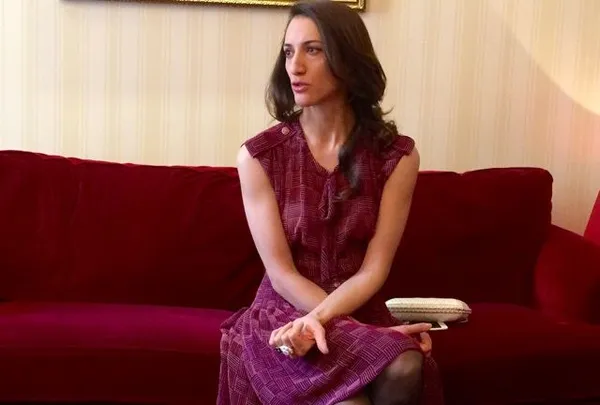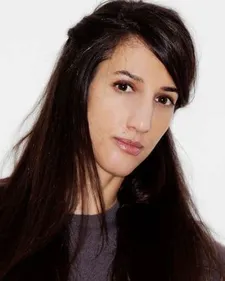 |
| Deniz Gamze Ergüven on female directors: "Women throughout art history and cinema have often been the objects rather than the people creating the art." Photo: Richard Mowe |
At the ripe old age of 36, Deniz Gamze Ergüven still baulks at questions about her identity. Her roots are Turkish but she lives and works in France - and her film Mustang (about five sisters growing up in a rural community) is France’s contender for best foreign film Oscar. The title, she says, is a nod to the horses that roam the plains of the Western US. It was inspired by a line in the first draft of the script that compared youngest sister Lale to a wild animal. "As soon as we appropriated the word, it meant something to us," says Ergüven, who worked on the narrative with co-writer Alice Winocour. In in a voiceover Lale describes the house as becoming a "wife factory." The girls are given instruction by local women in traditional cooking and homemaking as their grandmother sets the wheels in motion to arrange marriages for each of them. Ergüven talks about the Academy Awards, the role of women in Turkish society, and why the lack of sufficient numbers of female directors creates a distorted vision of the world.
 |
| Deniz Gamze Ergüven: “The film would not have happened if it had not been for French support.” Photo: Unifrance |
RM: Was the #Oscar nomination a vindication of your status and position against a chorus of disapproval in some quarters?
DGE: I look on it as a kind of back-up and a vote of confidence. There have been a lot of derogatory comments about the film, so the nomination suggests that perhaps I do know something about cinema after all and that the film resonates in some way. The Academy Awards is a very strong tribune and it is really a place where you have the possibility to talk and say things. It gives me a lot of strength and I regard it as a kind of shield in a way to protect me from negative comments.
RM: You are one of only two female directors in contention - does that give an added sense of responsibility?
DGE: Yes, there is only one other woman in contention, with a documentary. This is nothing new in terms of the representation of women in the profession. Ever since I was in film school it was always the case that there were very few female directors. When I was in Emergences film-writing lab in France (the equivalent of the Sundance lab) it was held in a retreat normally used by rugby players and so there seemed to be so much testosterone around. Ten years ago it was even more difficult - the hardest thing was to generate trust. When you make a film you have to walk through fire - that was the difficult part of the job, to convince people I was able and prepared to do it. Even on Mustang there was so much drama - I had the impression that I had to hijack one producer after another. Women throughout art history and cinema have often been the objects rather than the people creating the art. We are used to seeing the world through the eyes of men and that has given us an impoverished vision of things and a narrow perspective. Cinema is one of the strongest languages possible - so it is not just about equity in terms of numbers but more about having a different point of view.
RM: Was it complicated to film in Turkey?
DGE: It is a question of attitude - there were so many rules that I could not even begin to take them on board so I ignored them. In the town where we shot most of the film the women would eat separately from the men, but I ate with the men on the crew. I could not take the rigid divisions. It was tough because it was like navigating a river that you did not know without any idea of what was coming up around the bend.
RM: Are females in Turkey hidebound by generational traditions?
DGE: Many women live modern and free lives but others suffer from the shackles of the past, even in big cities. When you go to the kind of village where we shot the film, you find that it has almost been abandoned and is empty because people have left to go and live and work in the city. Old men seem to be at the centre of village life. Religion is present in the film but I did not want to saturate the debate by making to too central. The shape of Turkish society is not just about religion it is also about the code of honour and things that are inherent to the culture and our traditions as well as the influence of a patriarchal society which has not been questioned for decades. There are a lot of aspects of Turkish culture that are very positive: people generally are very caring and community comes before the individual. On the other hand the place of women in all of this is not questioned - even women do not seem to question it. The subject of the film is very specific: the filter of sexualisation through which women are seen, and it gives females a sense of guilt. Suggesting that everything women do is in some way sexual is very dangerous and restraining. My idea was to make a breach in this philosophy which has been going on so long that many females do not even realise something is wrong.
RM: Were there any problems about the film being released in Turkey?
DGE: The film has been released in Turkey. What I perceived however were very polarised reactions from both the press and the public. But they were always very passionate. Either people embraced the film and loved it and it struck chords with their own experiences or they really felt antagonistic towards it. They were also antagonistic towards me personally because of some of my outspoken comments about Turkish politics. So I always felt that these attacks were not on the subject matter of the film but more about negativity towards me personally. Now something different has emerged because of the Oscar nomination - people who did not like me have now started to undermine my credibility by saying “She is not really one of us” and that I am not really Turkish. I have never experienced anything quite like this before. There were also a lot of very aggressive messages on social media and I am quite sensitive about that. Of course social media is open to everyone but nevertheless I was shocked by that reaction. Today I found out that people who violently attacked the film in Turkey have now begun to quieten down since the Oscar nomination - and it as seen as something positive. Turkey is going through some very dark days at the moment - a whole group of academics who spoke out and signed the petition for peace have been placed in custody and the word terrorist is bandied about so that even journalists or anyone who has a mind of their own, are described as terrorists. The times are frightening - but I now am beginning to feel a bit more hopeful.
RM: Were you concerned about the image of your country as portrayed in the film?
DGE: I really believe films have an important role in revealing aspects of a country that you would not normally see. Remember that film Midnight Express [by Alan Parker] which gave a terrible image of Turkey. At one point if you said you were Turkish people would say ‘Oh, I have seen Midnight Express - is it really like that?’ It was so bad from my point of view and no actor in the film speaks Turkish although it might sound like Turkish. It felt like a lie. So that is why it is crucial to get it right. More than a century of cinema precedes us but my film is a story with a specific narrative rather than trying to portray the whole of Turkish society.
RM: What drew you to live and work in France?
DGE: I was six months when I first came here because my parents travelled around a lot - my father was a diplomat. Eventually we went back to live in Turkey but I was in love with France and at some point I chose to stay here and went to film school. Finally, the film would not have happened if it had not been for French support. To be in and out and not always feel the constraints you would as a woman in Turkey, it allows me to be able to articulate something about their everyday lives, which is in some ways more emotional.
Mustang is released in the UK on 13 May. Richard Mowe talked to Deniz Gamze Ergüven at the 18th Rendez-vous with French Cinema in Paris.









_225.webp)













